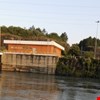
The Eastern area of Tucuman province was faced with significant problems of contaminated water. Extensive research was done, involving universities, and a project was carried out, applying the aspects of IWRM within the areas of technical solutions, institutional arrangements of future water supply operation. This case study highlights the importance of conducting research prior to a project to attain sufficient information.
The Pillahuinco basin is located in one of the most productive regions of Argentina. It is within the roads that connect the southernmost parts of the country with the capital and the far north, as well as the Andean provinces of the west with the ports of the Atlantic coast, intersect there. The basin covers a region with a distinct topography, presenting a highland area with elevations between 250 and 650 meters. With a plain that can reach about 125 meters where agricultural activities predominate. The agriculture activities have resulted to environmental problems calling for an approach that can provide solutions to support sustainable development of the basin.

The Graeme Hall Swamp is linked to the St. Lawrence Lagoon and is the last remaining coastal wetland in Barbados. The wetland has been designated as a Natural Heritage Conservation Area and has also been established as one of two Caribbean Coastal Marine Productivity Programme (CARICOMP) monitoring sites in Barbados. The Graeme Hall Watershed, located in the south of Barbados, spans 1,156 acres. The most significant element of this watershed is the Graeme Hall Swamp.

In Bolivia, shifts towards the privatisation of water supply and sewage services caused strong dissatisfaction, resulting in the eruption of social conflict. Because of the severe dissatisfaction, action was taken to cancel the previous agreements and instead launch a forum where government representatives, social organizations, the private sector and municipalities participate to formulate of a new policy. This case illustrates the crucial importance of rooting policies with the public.

A large proportion of Brazil’s population is lacking access to water and sanitation, and development is slow, in particular in rural areas due to lack of funds and political will, but also due to inefficiency in the resources allocation. Action has been taken by the State of Ceará to implement the model called Integrated Rural Water Supply and Sanitation System, illustrating that the most important component of attaining sustainable management is user participation.

The Toledo River basin is increasingly contaminated due to unsustainable agricultural practices, Action was taken through a UNESCO-IHP project aiming to perform an integrated environmental assessment of agricultural and farming production systems located in the Toledo River Basin. By using a multi-criteria approach, it was possible to highlight the interactions and use of natural capital, human-driven resources, and ecosystem services supporting agricultural and farming production systems.

The distribution of many rural communities in Brazil presents a major challenge in terms of providing access to energy. The production and consumption of energy can, however, have serious consequences for the natural environment. The energy sector in Brazil has been engaged in a process of ‘learning from mistakes'. One important lesson learnt is that establishing and maintaining a high-level policy consensus is key in achieving success.

The water resources of Brazil are subjected to pollution and mismanagement. Furthermore, it is susceptible to urban flooding and land-slides. To address these issues, action was taken to increase funding to the National Water Agency. In terms of IWRM, the key lesson learnt is the need for strong and well-funded executive agencies capable of putting laws into practice.

The Municipality of Talcahuano because of rapid urbanisation is subjected to natural resource degradation. Action was taken and a municipal strategy was created, assigning the municipality as the institution in charge of administering and combating natural resource degradation. This case illustrates the appropriateness of the municipal level of government in successfully addressing the recovery of water resources and environmental management.

In Chile, water has been privatised. However, in order to make sure that access was still available to all strata of society, the privatisation was accompanied by a robust regulatory framework, including a system of direct subsidies for drinking water consumption and sewage services for low income households. This case thus illustrates that in case of privatisation, a direct subsidiary scheme should be considered.